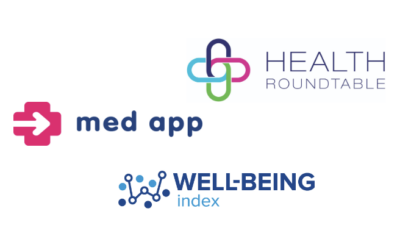This is the first article in our Clinician Wellbeing series written by Dr Caitlin Weston who works as a consultant to Med Apps providing direction and content for the Wellbeing section of Med App, offline-accessible, mobile-first tool that supports healthcare workers.
Clinician wellbeing is a topic which rightly demands attention at every level of medical practice. There is a simple – and now well researched logic – that supports measures which contribute to and sustain the wellbeing of clinicians, regardless of their experience, role and place of work.
In my 2016 Churchill Fellowship research report, Burning out: International Approaches to Clinician Wellbeing1, I documented international strategies that improve clinician wellbeing, and optimise their mental health and productivity.
Impacted by a direct experience through the untimely death of a friend and fellow clinician, I was compelled to understand both the contributing factors to clinician wellbeing and the actions that could ameliorate them.
The problem of mental ill-health among clinicians is not new, nor is it specific to Australia. International interest in clinician burnout and poor mental health has grown rapidly in recent years, and with it, the understanding of the effect these problems have on patient care and healthcare system efficiency. Clinician depression and burnout have been linked to higher rates of:
- Medication errors
- Surgical errors
- Infection rates
- Mortality
- Patient complaints
- Staff turnover.2-7
It is understanding of these complex issues which brought thought leaders in the field to claim clinician wellness and engagement as the fourth quality indicator in healthcare, placing it alongside “improving patient experience” and “reducing the per capita cost of healthcare” as key goals that support an overarching objective to improve population health.
The National Framework is changing the perception of clinician wellbeing
Since the publication of my research five years ago, more advances have been made beyond those documented in the report. Australian state and federal government recognition of the problem has led to allocation of over $1 million in funding dedicated to mental health programs for doctors.
Additionally, the Every Doctor, Every Setting: A National Framework8 was launched in October 2020 with the purpose of guiding coordinated action on the mental health of doctors and medical students. The National Framework is based on the understanding that improvement in the wellbeing of doctors and medical students will lead to better quality patient care and healthier communities. This is reflected in my own research and research conducted by many others since the mid-seventies when burnout was first identified as an issue arising from chronic workplace stress.9
The National Framework’s development was supported by Everymind in conjunction with the medical profession and Australia’s mental health leaders. The Australian Government has funded the Framework through The Prevention Hub (co-led by the Black Dog Institute and Everymind). The Framework provides for specific project funding for Tackling Mental Ill-Health in Doctors and Medical Students.8
The pillars under which reform actions will be taken through the National Framework’s program are focused on providing support to every doctor in every setting:
- Improve training and work environments
- Recognise and respond to those needing support
- Improve response to doctors and medical students impacted
- Improve the culture of the medical profession
- Improve coordinated action and accountability.
How others are contributing to the wellbeing of clinicians
I have been pleased to work together with Med Apps as a consultant having seen the alignment in values and purpose, namely by bringing more awareness to the need for providing support to every healthcare professional.
As a business with the wellbeing of clinicians as its heart, it is encouraging to see the recognition this topic is gaining across diverse channels through which meaningful change can be made. Together, we will keep our community appraised of our work in this arena as their digital tools like Med App continue to evolve and support those who provide essential frontline healthcare.
Dr Caitlin Weston’s report on clinician wellbeing is available for download through Med Apps and from the Churchill Trust website. Click here or schedule a call with the Med App team to discuss how we can support the wellbeing of your team with a free demonstration at your workplace. For more information, reach out via email at tom@med.app.
Med App is an offline-accessible, mobile-first tool. It is ideal for the hospital environment where clinicians at all career stages may be affected by mental ill-health and not know how to manage it. Med App has been designed by clinicians for clinicians, and continues to innovate and improve the experience of frontline health workers and the patients to whom they deliver care.
- Weston, Caitlin. Burning out: International Approaches to Clinician Wellbeing. The Winston Churchill Memorial Trust, Canberra, 2018.
- Fahrenkopf, A.M., et al., Rates of medication errors among depressed and burnt out residents: prospective cohort study. BMJ, 2008. 336(7642): p. 488-491.
- Shanafelt, T.D., et al., Burnout and medical errors among American surgeons. Annals of surgery, 2010. 251(6): p. 995-1000.
- Welp, A., L.L. Meier, and T. Manser, Emotional exhaustion and workload predict clinician-rated and objective patient safety. Frontiers in psychology, 2015. 5: p. 1573.
- Welle, D., et al. Physician wellness measures are associated with unsolicited patient complaints: A marker for increased liability risk. in American Conference on Physician Health. 2017. San Francisco.
- Hamidi, M.S., et al. The economic cost of physician turnover attributable to burnout. in America Conference on Physician Health. 2017. San Francisco, CA.
- Anagnostopoulos, F., et al., Physician Burnout and Patient Satisfaction with Consultation in Primary Health Care Settings: Evidence of Relationships from a one-with-many Design. Journal of Clinical Psychology in Medical Settings, 2012. 19(4): p. 401-410.
- Everymind Every Doctor, Every Setting: A national framework to guide coordinated action on the mental health of doctors and medical students. (2019)Viewed on 29 March 2021
- Coughlan, Alison. The epidemic of burnout in the health and social sectors. Hospitals and Healthcare; (2021) Viewed 31 March, 2021





0 Comments